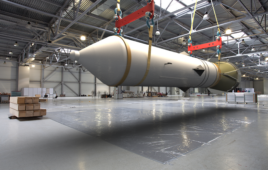(Reuters) – A pair of spacewalking astronauts floated outside the International Space Station on Thursday to attempt to bypass a leak in one of the outpost’s cooling systems.
Engineers suspect a micrometeoroid or tiny piece of space debris may have punched a hole no bigger than the width of a hair into one of the station’s radiators.
The devices dissipate heat from batteries and other equipment aboard the solar-powered station, a $100 billion laboratory for biological, fluid physics and other science experiments now flying about 255 miles above Earth.
Station commander Sunita Williams and flight engineer Akihiko Hoshide left the station’s Quest airlock around 8:30 a.m. EDT for what was expected to be a 6.5-hour spacewalk to reconfigure ammonia coolant lines and hook up a spare radiator.
The leak is small so it will take several weeks to determine if the radiator was the source, said space station program manager Mike Suffredini.
If routing ammonia through the spare radiator does not stem the leak, another spacewalk to replace a pump or other equipment in the system may be needed.
Unless it is fixed, the leak eventually would trigger the cooling system to shut down, leaving the station without a backup system for a section of the station’s solar arrays.
The cooling system holds about 50 pounds (22.7 kg) of ammonia. It would automatically shut down if the ammonia level drops to 40 pounds (18 kg), said flight director Mike Lammers.
As ground control teams prepared for the spacewalk on Wednesday, the station had to maneuver to avoid another piece of debris. This piece was part of the wreckage from the 2009 collision of an Iridium communications satellite and a Russian satellite.
The maneuver fell a bit short due to a software issue that prevented all the thrusters on a Russian cargo ship attached to the station from firing. NASA said the station, a project of 15 nations, was repositioned out of harm’s way, with no further rocket firings needed.
While Williams and Hoshide worked outside, their four crewmates began unpacking another Russian Progress cargo ship that arrived on Wednesday.
(Editing by Jane Sutton and Vicki Allen)
Filed Under: Aerospace + defense




